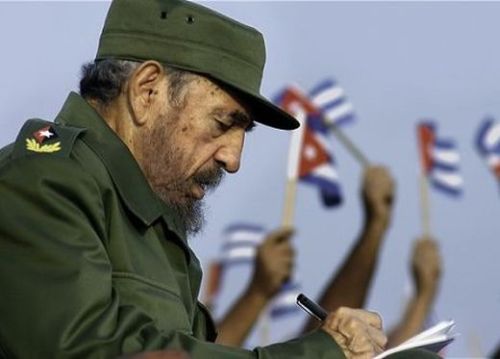Even when 90 years later, in the painful physical farewell, his compatriots cried out “I am Fidel”, it was clear the enormous challenge of continuing to be guided by that light, self-imposed by homage and deep convictions, emanating from its flagship flag
In days like these, Cubans decidedly go beyond the ceremonies at the altar of the Homeland and the public acts and rites, performed because they are beautiful and exalting
To this effect, many try to assume the arduous challenge of working on the intimate Fidel that each one of us must carry inside, surpassing slogans, set phrases and turning his teachings into creative action.
The sons and daughters of this land have always been more devoted to heroic work, even at the cost of their lives and in the clamor of the most just battles, than in the calm necessary for the fulfillment of their duty in the peaceful daily life.
The energy of an ardent blood and a culture with deep-rooted values, in favor of freedom and justice, is thought to define us as a people.
Who does not remember the Commander in Chief of the Rebel Army when he affirmed that this would be the true Revolution, on January 1, 1959 in Santiago de Cuba, after the victory.
And when he said later, on January 8 in Havana, that from now on things could be more difficult and warned us, also in the midst of the immense joy, to beware of our own mistakes.
The Fidel who always made it clear to the enemies of the Revolution that there would never be surrender, and led the sons of this land in so many heroic battles, in the midst of great achievements, also calls them now to continue striving more from within to improve themselves, the greatest challenge a human being can take on.
A plausible endeavor in spite of everything, because in Cuba there are more than enough spiritual, intellectual, moral and character reserves to do so.
The grateful masses and even the ungrateful ones know well, from the bottom of their minds, how decisive was the contribution of the Leader in social equality and in the creation of the foundations for the Cuban people to be educated, cultured and instructed in general education, science and technology.
The fulfillment of duty is then imposed, that task less noisy and visible than the frontal combats, also necessary, and that requires constancy, endless dedication and consecration in body and soul knowing that it is the only way to move forward and ensure the continuity of the model of society that we choose.
A peremptory demand in times of the fiercest blockade that any country has ever known, it is well known.
We owe it to you and to us, Fidel, it is good to remember again in your homeland, in the midst of the validity of your living work and the fond remembrances.
Fidel’s life is an inspiring example: a revolutionary who forged himself as a fighter for the most just causes and had in his family, especially in his father Angel Castro and his mother Lina Ruz, two pillars of such precious wood.
He was born in the rural town of Biran, in the former province of Oriente, today belonging to the northeastern province of Holguin.
He obtained excellent grades and always excelled since elementary school, he received most of his schooling in Santiago de Cuba, although he finished his high school at the Belen School in Havana.
He enrolled to study Law at the University of Havana in 1945, after having concluded his studies at the Jesuit institution in Havana with outstanding results.
He would always remember the role of the University in the acquisition of his revolutionary conscience and political thought.
It was a period of intense action, for which he suffered beatings in the streets and arbitrary arrests, and in which he also came into contact with the Marxist ideology.
It was during those times that he began his vocation for Latin American solidarity, born out of his deep admiration for the work of Jose Marti, one of his great moral mentors, and his study of Simon Bolivar. He was also a member of the People’s Party, known as the Orthodox Party.
After graduating as a lawyer, with two degrees in legal disciplines, he opted to establish himself in a law firm dedicated to helping humble people.
His combative firsts occurred during the confrontation with President Ramón Grau San Martín. The coup d’état of Fulgencio Batista, in 1952, marked the coming of age of his convictions, and the radicalization and deepening of his revolutionary thinking.
From 1953 onwards, came the assaults on the Moncada and Carlos Manuel de Cespedes garrisons, the historic July 26th of that year, the unjust but fruitful imprisonment, the amnesty in 1955, the forced exile in Mexico and the return to fight definitively in the Sierra Maestra, where he arrived after a hazardous trip with 82 expeditionaries on December 2, 1956.
From that heroic bastion, before two years had passed, the insurrection descended to the plains and spread throughout Cuba. The great epic led by Fidel, at the head of the glorious Rebel Army, deserves a separate space.
The defiant, beautiful, founding, always transforming task of the Cuban Revolution, in the face of the most powerful enemy on Earth, consecrated him before his compatriots, who confirm, remembering the Apostle: Death is not true when the work of life has been well accomplished.
 Escambray ENGLISH EDITION
Escambray ENGLISH EDITION





Escambray reserves the right to publish comments.